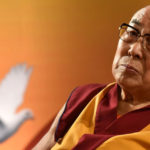The Dalai Lama has warned of a possible “double reincarnation” with one from a “free country” after Beijing reiterated that his next incarnation must comply with Chinese law.
The Tibetan Buddhist leader on Monday warned that a successor chosen by Beijing after his eventual death could not be trusted.
He said it is possible that his reincarnation could be found in India, where he has lived in exile for 60 years upon fleeing Tibet following a failed uprising against Chinese rule.
“In future, in case you see two Dalai Lamas come, one from here, in free country, one chosen by Chinese, then nobody will trust, nobody will respect [the one chosen by China].
“So that’s an additional problem for the Chinese! It’s possible, it can happen,” he told Reuters in an interview.

The Dalai Lama has lived in exile in northern India since the failed uprising, along with other Tibetans CREDIT: MONEY SHARMA/AFP/GETTY IMAGES
China stated in response that its leaders have the right to approve the Dalai Lama’s successor. The selection process “must comply with Chinese laws and regulations,” according to Geng Shuang, a spokesman for the foreign ministry.
Chinese state media highlighted those laws, titled “New Regulations on Religious Affairs and the Rules on the Management of the Reincarnation of Tibetan Living Buddhas.”
Many Tibetans, who believe that the soul of a senior Buddhist monk is reincarnated into the physical body of a child upon his death, worry a successor chosen by Beijing will be under the thumb of the ruling Communist Party.
Now at 83, it’s getting harder for him to travel the world to boost awareness, and his influence is waning just as China’s is growing on the world stage.

The Dalai Lama is now 83 CREDIT: STR/AFP/GETTY IMAGES
Beijing has recently cracked down heavily on religion under president Xi Jinping, after the government vowed to “Sinicise” faith. The wave of repression has affected Muslims, Christians, and Buddhists.
“China considers Dalai Lama’s reincarnation as something very important,” the Dalai Lama said in an interview with Reuters. “They have more concern about the next Dalai Lama than me.”
Beijing has previously co-opted the spiritual reincarnation process with a goal of bringing Tibetan Buddhism within party lines.
In 1995, the Dalai Lama named a young Tibetan boy as the reincarnation of the previous Panchen Lama – the second highest in spiritual authority after himself. But the child was then put under what Chinese officials described as protective custody.
Beijing put forth another successor and the Dalai Lama’s choice – then only six years old – disappeared from public.
The Chinese government has sought to discredit the Dalai Lama. In March, Wu Yingjie, leader of a parliamentary delegation from Tibet, said that Tibetans didn’t love the Dalai Lama at all.
Last May, Tashi Wangchuk, a Tibetan businessman, was given a five-year prison sentence by China for promoting the Tibetan language, based on comments made in interviews with the New York Times.
The Tibet Autonomous Region, in China’s far west, is considered a homeland to many Tibetans and remains on lockdown. Travel in and out of the region is difficult, even for Tibetans.
Foreign journalists cannot visit without government permission, and those requests are frequently denied. Chinese officials have said they are concerned this is out of concern that foreigners may find it difficult to acclimate to the high altitudes on the Tibetan plateau.








